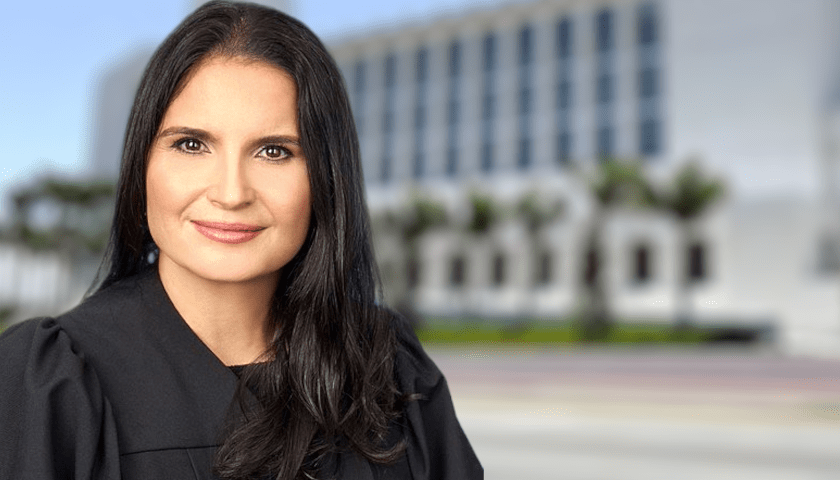by Julie Kelly
I am digging into a few other matters related to this case, the contempt order issued Thursday against veteran investigative reporter Catherine Herridge, and a new appellate court ruling overturning the use of a sentencing enhancement for J6ers convicted of the controversial 1512(c)(2) charge so unfortunately I can’t write a full article on yesterday’s hearing that I attended in person in Fort Pierce. So I want to share my X posts about what happened.
A few additional observations: Judge Cannon’s approach and style is inimical from that of judges in D.C. For part of the proceedings, I kept thinking how DOJ’s J6 prosecution in Washington would be so different if only half the judges were as careful and prepared and nontheatrical as Cannon. I shared this with a J6 defense attorney last night and he agreed.
As I reported here, there is no love lost between Cannon and Jay Bratt, one of Jack Smith’s lead prosecutors who was handling the case at DOJ before Smith’s appointment then assigned to special counsel’s office in November 2022. Bratt is just not that impressive; DOJ’s David Harbach performs a little better, more theatrical and engaging.
I was not in the courtroom but in the overflow room packed with fake news reporters (haha). Reporters who were in the courtroom noted Trump’s upbeat demeanor and how Trump and Smith exchanged glances and at one point locked eyes.
Pockets of supporters lined the streets in Fort Pierce, a little beach town about 60 miles north of Palm Beach—which is why Trump can easily make the drive (luckily, I was ahead of his motorcade!) Lots of police including federal agents around the courthouse.
From X on March 1:
LUNCH BREAK in Florida courtroom of Judge Cannon in classified documents case. President Trump arrived at 9:55 along with his attorneys and co-defendants.
Special Counsel Jack Smith here too but did not speak during morning session. Judge Cannon (pictured above) appears unfazed by yet another historic hearing in her courtroom. She peppered Smith’s team with questions about timing of new trial date—DOJ asking for early July—and the VERY contentious issue about scope of prosecution team.
At the outset, Judge Cannon stated the Special Counsel’s new proposed trial schedule (May 20 trial date will be vacated) leading to trial date of July 8 is “unrealistic” given at least 13 outstanding motions and intense CIPA litigation (special guidance on the handling/access to classified evidence before and during trial.) Another issue is Alvin Bragg’s prosecution of Trump later this month; trial is expected to begin March 25 and last between 6-8 weeks, interrupting Trump’s ability to attend any court proceedings in FLA for almost two months.
When Smith’s team tried to blame Trump attorney Chris Kise for taking on both the Bragg case and the classified docs case and argued his work schedule related to both matters should not preclude the FLA trial from moving forward, Judge Cannon reminded DOJ that right to access all court proceedings doesn’t apply to the lawyers but “to the accused.”
Much of the debate centered around the definition of the scope of the prosecution team. In January, Trump filed a lengthy motion detailing numerous government agencies including the Biden White House involved in the investigation and prosecution of the classified docs case. Agencies include NARA, DOJ, FBI HQ, the intelligence community, DOD, DOE and the other usual suspects.
Contrary to public assertions and Jack Smith’s indictment, it appears NARA and DOJ and even the Biden White House general counsel were in cahoots as early as spring 2021 to concoct a documents charge against Trump. DOJ says FBI opened an investigation into mishandling of classified docs in March 2022 after NARA sent a criminal referral following the alleged discovery of files with “classified markings” in the 15 boxes Team Trump gave to NARA in Jan 2022. But the defense team has evidence–including emails and other records–to dispute that so they want an evidentiary hearing on the full scope of the prosecution team to determine which federal agencies or officials must meet Jencks, Giglio, and Brady discovery obligations.
Smith’s team claims the only members of the prosecution team are their prosecutors, some agents/investigators from Washington FBI field office, and a few agents from Miami FBI field office. But Cannon pushed Jay Bratt, the lead prosecutor in classified docs case also involved in the investigation before Smith was appointed (he visited Mar-a-Lago with 3 FBI agents in June 2022) to admit at least 3 FBI officials from FBI HQ were involved as well.
Smith is fighting not just the motion to compel discovery based on Trump’s scope of prosecution team but doesn’t even want Judge Cannon to hold an evidentiary hearing on the matter. And Bratt said very emphatically, “we need to bring this case to trial this summer.” Judge Cannon again sounded skeptical. “There is a lot of pretrial work that has to be done and it needs to be done properly and correctly.”
The afternoon session should also be contentious as both sides argue about redactions and unsealing of evidence. Cannon repeatedly reminds DOJ about the need to make as much information accessible to the public and on several occasions has unsealed filings that Jack Smith wanted sealed.
She ordered some records unsealed last month from the motion to compel but put her order on temporary hold pending Smith’s motion for reconsideration. He wants most of redacted passages and sealed exhibits in the motion to compel discovery to remain secret. Cannon is not so inclined so I am expecting some fireworks this afternoon. Again no devices allowed in courthouse (!!) so I will report back later.
Before I get to summary of afternoon proceedings in FLA classified docs hearing, I want to isolate this.
It appears that records related to the grand jury proceedings in DC on the classified docs case remain under seal and have not been transmitted to Judge Cannon or defense.
Recall that almost the entire investigation into the classified docs matter took place in Washington DC–not southern FLA even though it is the controlling jurisdiction since the alleged “crime” of retaining classified records/national defense info happened at Mar-a-Lago in Palm Beach. DOJ then Jack Smith kept the case in Trump-hating DC courthouse so they could get favorable rulings from then-chief judge Beryl Howell–which they did. For example, Howell cited the crime fraud exception to justify piercing atty-client privilege between Trump and his lawyer, Evan Corcoran, to force Corcoran to turn over his records to DOJ.
Highly unlikely that would have happened in FLA especially before Judge Cannon.
But right before indictment, Jack Smith moved the case to Florida. Reports at the time indicated DOJ read summaries of its grand jury evidence to a FLA grand jury in order to secure the indictment. So, how is it almost nine months post-indictment that trove of evidence remains under seal? When the issue was raised, David Harbach said DOJ was “in the process” of asking the current DC chief judge James Boasberg to review the file, add redactions if needed, and transmit to FLA court.
Afternoon hearing in classified docs case in FLA ended around 3pm. As expected, both sides clashed over unsealing redacted information–Trump wants swath of discovery unsealed, Jack Smith does not–with Judge Cannon pressing both sides for clarity.
Cannon is no nonsense, very low key, only got animated once or twice. The biggest dispute was over the release of names of witnesses and their statements. Jack Smith’s team wants names and statements kept secret–prosecutor David Harbach claimed that witnesses are harassed, intimidated, and threatened “in any case where Donald Trump is a defendant.”
Cannon pushed back on that claim, arguing that it would be “unprecedented” to keep names of witnesses and their substantive statements under seal in court motions–particularly names and statements of government officials. Cannon said she understood the need to protect the safety of witnesses but that it is “not possible to shield everyone from the internet.”
She had asked for proof of legitimate threats to potential witnesses; Smith’s team came back with one example (they also tried to keep under seal) of a potential witness who received social media “threats” after the indictment was announced. Useful to note Judge Cannon is the only official involved in any of the Trump cases that received death threats legit enough to land one woman in prison.
Witness lists are made public before trial–even Smith’s team acknowledged that reality. DOJ just resists making the list and statements public now. At first, DOJ said it had 87 potential government witnesses (they also asked to file that list under seal months ago, Cannon said no.) Now Smith’s team says it will call 40 witnesses and wants the names of 25 witnesses redacted. [SIDE NOTE: Reporters in the courtroom later described how Smith sat up straight in his seat and expressed “shock” at Cannon’s question about witness lists.]
Defense also wants Mar-a-Lago application and search warrant fully redacted. There is a protective order in place as well (common practice) but Smith’s team sort of apologized at the beginning for over-relying on the protective order to keep filings under seal. “We could have done a better job. We are owning that,” Harbach said.
Recall that Jack Smith used the “witness intimidation” claim to seek a gag order preventing Trump from making public statements about “prospective witnesses” in the DC J6 case. Chutkan agreed but the DC appellate court tweaked that part of her gag order to only prevent Trump from making derogatory public comments about potential witnesses about the case.
My guess is Cannon agrees to redact a good chunk of the motion to compel and limits release of witness names/statements to government officials, past or present. Then we will really see Jack Smith’s head explode bc that is EXACTLY what he wants to conceal.
– – –
Julie Kelly is an independent journalist covering the weaponization of the U.S. Government against her citizens, Follow Kelly on Twitter / X.
Photo “Aileen Cannon” by Southern District of Florida.





